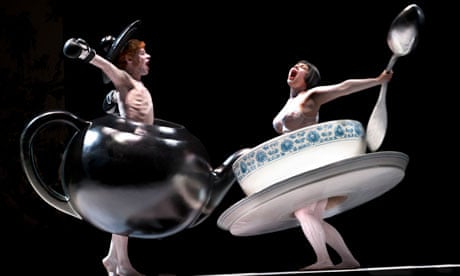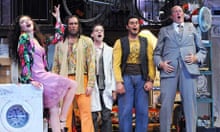Artifice and technical perfection: chilling terms when applied to almost any work of art outside the music of Ravel. Famously a lover of toys, automata, fakes of all kinds, he sought beauty through distillation and control. His creations glitter and scintillate. Yet still, perversely, he can touch the heart. Glyndebourne's new double bill of L'heure espagnole and L'enfant et les sortilèges – Ravel's only operas – matches the composer's ethereal precision with near flawless performances and dazzling stagings, conducted by Kazushi Ono and directed by Laurent Pelly, who also designed the costumes.
Sex dominates L'heure espagnole (1911), but the one brief moment of congress takes place off stage. This canny ploy means the action, heaving with innuendo and jokes about pendulums, can be played straight, making it all the funnier. Taken from a comédie-bouffe by Franc-Nohain, the opera pushes farce to musical and verbal limits. At the start, three clocks tick at different speeds, coinciding every 15 seconds – a brittle conceit of the kind Ravel enjoyed. Torquemada, the town clock-maker, leaves his shop each week for an hour, abandoning his wife, the concupiscent Concepción, free to receive her lovers.
With three contenders, time is of the essence. Don Iñigo Gómez (Paul Gay), the smug, portly banker, and Gonzalve (Alek Shrader), the poet whose words are more virile than his deeds, are forced to hide in coffin-sized clocks so Concepción can have her way with Ramiro (Elliot Madore) the gormless muleteer. Better a man who can lift a clock than hide in one. Or never mind the brain, feel the biceps – as Boccaccio nearly but didn't quite say in the opera's closing lines.
Ono, who collaborated with Pelly in Glyndebourne's successful Hänsel und Gretel in 2008, kept textures transparent, the percussive effects of harp, celesta, triangle, castanets and xylophone at once compounding the score's hairspring oscillations and adding lustre. Whirring mechanical patterns are dusted lightly with salacious waltzes and Hispanic rhythms – jota, malagueña and habanera – at once arch and suggestive, each beautifully rendered by the London Philharmonic Orchestra in full erotic flight. Ravel was, let's not forget, the man who, despite or because of his own arid love life, wrote Bolero ("Did you ever do it to Ravel's Bolero?" Bo Derek asked, famously, in the 1979 film 10, thereby giving the composer fresh celebrity, though the chaste violence of Torvill and Dean on ice five years later certainly helped).
The designs by Caroline Ginet and Florence Evrard – first created for the Opéra National de Paris – combine the shop's well ordered interior with behind-the-counter garish squalor: Concepción (Stéphanie d'Oustrac, pert and sinewy in voice and physique) runs a laundry, to judge from the sluttish array of washing machine, buckets, ironing board and industrial box of soap powder, all piled vertiginously together with Roman Catholic knick-knacks and a car whose headlights flash on and off when the action hots up.
In contrast, the streamlined elegance of L'enfant et les sortilèges (1925), designed by Barbara de Limburg, suited that work's surreal fairytale text, purpose-written for Ravel by Colette. The story of a child and some magic spells sounds whimsical: a naughty boy has to confront the inanimate objects, now come to life, which he has destroyed in his tantrums, before eventually getting wisdom via a hurt squirrel. Written several years after L'heure, L'enfant shows Ravel's new musical preoccupations: a Wedgwood teapot and a Chinese teacup dance to a ragtime foxtrot in a score rippled through with jazz, blues and melody.
The Child's fears are haunting and poignant. Pastoral figures torn from toile de Jouy wallpaper lament their destruction, looming like engraved ghosts. Cats hiss with menacing sexuality, insects accuse, trees – which process towards the child in a moment of pure theatrical alchemy – vent their anger until at last the perils and dangers of this night are over: the boy holds out his arms and the music calls out the reassuring, two-note "Maman".
Ensemble cast and chorus excelled. Khatouna Gadelia, in her Glyndebourne debut as the Child, expressed the incipient nursery fears in us all for ever. A friend of Ravel's once described this small, dapper man, whose favourite possession was a mechanical nightingale in a gilded cage, as both a child and an old man. He would surely have been overjoyed by this near perfect double bill. See it live on Sunday 19 August in cinemas or streamed on theguardian.com/glyndebourne.
Given his taste for the miniature, for his Japanese garden and rows of dwarf trees, Ravel's muted enthusiasm for Wagner, the sprawler to beat all sprawlers, is hardly a surprise. Luckily he won't have to endure 2013, the bicentenary of Wagner's birth. The torch relay has already begun at the Proms, relatively modestly before Barenboim conducts a full Ring cycle next season (not a well-kept secret so I am betraying no confidences). The BBC Philharmonic, in the third of four appearances, gave a slow, richly ecstatic account of the Prelude to Tristan und Isolde. The whole opera taken at that speed would have turned into a three-day event but here provided an opportunity to appreciate the orchestra's talent for colour and well-drilled detail.
Bruckner may have preferred God to gods, sex and dragons, but he remains Wagner's most devoted disciple. The humble village schoolmaster's son had some catastrophic encounters with audiences and critics in his time, not least at the premiere of his Third Symphony. The Sixth, which followed – ignore the arithmetic; order of performance and of writing in Bruckner's case does not always tally – fared marginally better but remains unfamiliar, considered stylistically outside the main Bruckner canon. Perhaps that is part of its appeal, especially in a performance as taut and supple, as well as massive and thunderous, as the BBC Phil's under the baton of music director Juanjo Mena.
As a pivot between these two Romantic giants, James MacMillan's Credo, a BBC co-commission world premiere, proved ideal. Written for concert rather than liturgical purposes, and demanding a choir of around 140 voices – here the combined forces of the Manchester Chamber Choir, Northern Sinfonia Chorus and Rushley Singers – this 25-minute work displayed MacMillan's gift for achieving emotional effect on a substantial scale. The three-section setting of the Latin text, often moving in simple blocks to keep the words clear, conjured the mood of Russian Orthodox music – a huge challenge to the choir who survived all but the most exposed passages – while the conspicuous brass writing was a reminder of the band music with which the Ayrshire-born composer grew up.
In Part One, praising God as maker of "all things visible and invisible", the strings repeated an upward, galloping figure offset by snarling bassoons, fanfares of brass and voices united in declamation. Part Two, the exploration of faith, reaches sonorous crisis at the crucifixion and resurrection to a vivid accompaniment of three solo violas. The Spiritus Sanctus draws on ancient plainchant and culminates in a big "Amen". At the start of this expansive, final part, the orchestra buzzes strangely, achieved by flutter-tonguing in the woodwind and the rapid tremolando bowing of the strings. According to MacMillan this represents the Holy Spirit. Whether this means something or nothing to you, the audience in the Albert Hall cheered enthusiastically, their faith, in music at least, fully renewed.




Comments (…)
Sign in or create your Guardian account to join the discussion